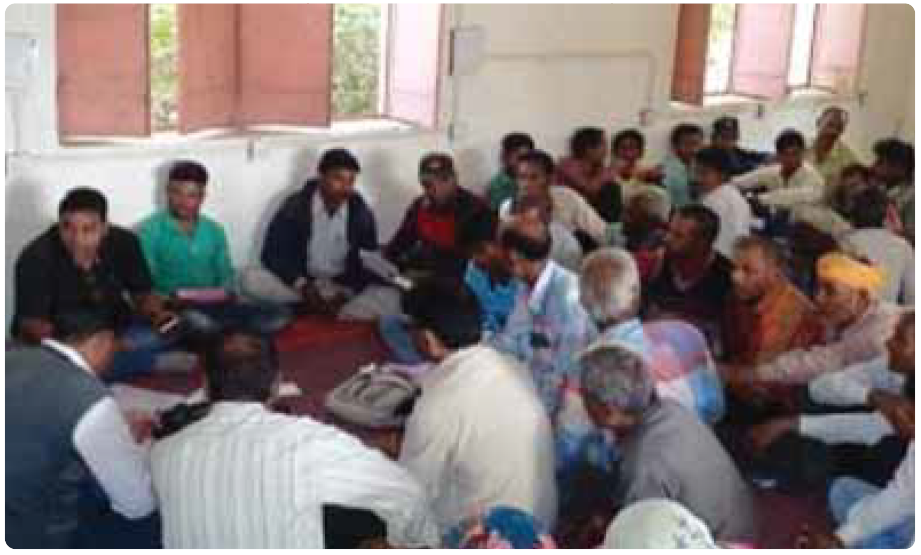Participatory identification of poor for skilling in Rajasthan
Participatory identification of poor for skilling in Rajasthan
Rajasthan Skill & Livelihoods Development Corporation (RSLDC) has initiated a unique initiative of participatory identification of the poor (PIP) through the involvement of Gram Sabhas for skilling activity. The initiative was launched in 2014.
About the intiative
PIP is used as an innovative strategy to mobilise and identify skill aspirants. Mobilisation of rural youth for skill training programmes has always been a challenge especially in far-flung and difficult areas. PIP has come out as an effective mechanism to improve outreach by using existing infrastructure.
PIP is a one-day event, organized across more than 9900 Gram Panchayats in Rajasthan for identification of poor rural youth. It has been done as part of the National Rural Livelihood Mission (NRLM), which aims to skill rural poor youth and provide jobs with regular monthly wages at or above the minimum wages.
Intervention
- PIP aims to identify suitable rural poor youth for participation in skill development programmes and augment their livelihood opportunities.
- The target group from rural poor youth is identified in the age group of 15-35 years. The upper age limit for Women, Particularly Vulnerable Tribal Group (PVTGs), PWDS, transgender, bonded labourers, victims of trafficking, manual scavengers, HIV positive persons etc. is 45 years.
- This is done through an interactive atmosphere within localities where youth resides with the help of representation of district administration and related departments.
- The key stakeholders involved in the PIP Operate at four levels - State, district, Panchayat Samiti and Gram Panchayat at their levels.
| State | Department of Rural Development and Panchayatiraj, Rajasthan Skill and Livelihoods Development Corporation (RSLDC) |
| District | District Collector, CEO of Zila Parishad, District Project Coordinator |
| Panchayat Samiti | Block Development Officers |
| Gram Panchayat | Sarpanch, Panchayat Secretary, Families of rural poor youth |
- The process starts with RSLDC's coordinating with the Department of Rural Development and Panchayati Raj, Government of Rajasthan wherein information about Scheme is shared and instruction to CEOs of Zila Parishads is provided for arranging Special Gram Sabha on Specified date and to successfully organize the PIP process.
- The formats are Sent to Block Development Officers (BDOs) who in turn distribute it at the Gram Panchayat level. The district teams of RSLDC and representatives of other departments ensure their participation in the Special Gram Sabha.
- The roles are clearly defined for everyone and the process is completed in One day within a Cost of Rs. 25,000/- per Panchayat Samiti. This cost is minimal as compared to other methods of mobilization done by various training partners.
- Advertisements are published 2-3 times in local newspapers before the due date for Creating awareness among the target beneficiaries about the event.
- RD &PR's State and field level officials provide enough support to RSLDC in making these Special Gram Sabhas meaningful.
- The identified data is shared with empanelled training partners which is again a great help to the training partners.
Before the Scheduled date of Special Gram Sabha, following documents are sent to each Gram Panchayat through the field functionaries:
- Guidelines of skill development programme
- Eligibility criteria of youth for skilling
- Agenda note for the Special Gram Sabha
- Registration form for the identified eligible rural poor youth
- Format for compilation of data at BDO level
- Release of funds to all CEO, Zila Parishad to meet the petty expenditures and getting the data online.
On the Scheduled date of Special Gram Sabha,
- Stakeholders assemble at the designated place, preferably at the Gram panchayat headquarters.
- The representatives of RD&PR and RSLDC apprise the rural families about the sc
 heme guidelines, eligibility criteria etc.
heme guidelines, eligibility criteria etc. - Sarpanch/Panchayat Secretary read out the agenda of Special Gram Sabha.
- The aspirants place their candidature for consideration.
- The final names of eligible poor youth are decided through a consensus.
- The identified youth are registered with RSLDC on its MIS for skill training programmes.
- The scheme is implemented using existing infrastructure.
- Gram Sabhas play a critical role in determining the eligibility criteria and enrolment of eligible youth.
- The district administration and Project Management Consulting Agency play a vital role in organizing the One-day programme.
- The BDOS play a substantial role in capacity building of Panchayat representatives, availability of documents at the Gram Sabha level and conducting the programme.
- Due to this integrated effort, the cost of the programme is very nominal and the result is implausible.
Impact
Increased Outreach
The Participatory identification of Poor (PIP) through Special Gram Sabhas has been a tested and effective tool to reach the common people to make them aware of the skilling initiatives and enroll them for the same to enhance livelihood Opportunities. During the period 2014 -16, each year, Special Gram Sabhas were conducted by RSLDC wherein PIP process was carried out.
Out of the total enrolled youth of 3,82,876, around 1,50,000 youth have been trained in various skill training programmes. This has also improved enrollment, retention and awareness about skill programmes.
Key takeaways
- Optimum utilization of existing resources to mobilise youth
- Improved interface between rural poor & government functionaries
- Cost effective and less time consuming
- Since the Gram Sabha plays the leading role in identification and mobilization of eligible youth, this practice can easily be adopted in other states.
Last Modified : 7/1/2024
This topic provides information about the Converge...
This topic provides information about improved pla...
This topic provides information about Captive rear...
This topic covers the information related to Comme...
